The Ultimate Guide to Sealing Oils for Hair
This post may contain affiliate links, and I will earn a commission if you purchase through these links. Please read the disclosure policy for more details.
It’s no surprise that hair oils are incredibly popular at the moment. They’re a chemical-free and inexpensive way to pamper natural hair, helping to make it softer, shinier, and more manageable.
But do you know the difference between moisturizing and sealing oils for natural hair?
Sealing oils like grapeseed oil and castor oil have very different effects compared to penetrating oils like avocado oil or olive oil. So, it’s essential to know how to choose the right one to get the best results for your hair.
This guide will help you learn the difference between various oils. You’ll discover how to use a sealing oil for hair and how to pick the best oil for your hair type so you can make the most of these fantastic natural oils.
What Are Sealing Oils?
As the name suggests, sealing oils create a protective seal on the surface of your hair cuticles. They’re often thick, heavy oils that help keep moisture locked deep inside the hair shaft.
These oils are best used after you’ve washed and moisturized your hair with conditioners, hair masks, and hot oil treatments. That’s because although sealing oils stop natural hair from losing hydration, they also prevent it from absorbing any more moisture.
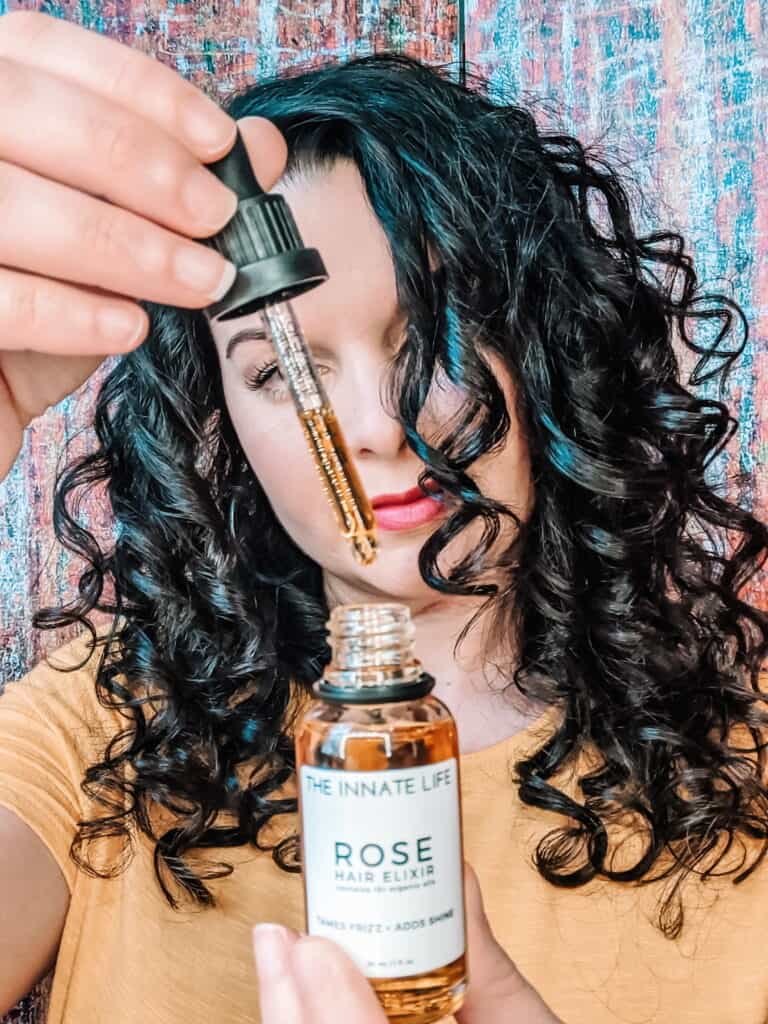
What’s the difference between Moisturizing Oils vs Sealing Oils?
The different oils used in hair care are generally categorized as a moisturizing oil (also known as penetrating oils) and sealing oils or sealants.
The difference between these oils comes down to the length of the carbon chains that make up the fatty acids in the oil. Oils like olive oil and coconut oil have short chains that can penetrate the hair shaft more easily. Other oils with long chains, like black castor oil and jojoba oil, can’t penetrate the hair but are better at forming a seal on the hair cuticles.
There’s also a third category of oils with medium-length chains that will both seal and penetrate your hair strands. However, it’s important to remember that these don’t seal natural hair as well as sealing oils.
The Importance of Sealing Oils in Hair Care Routine
Sealing oils are used at the end of your routine to coat the hair cuticle with a protective layer. If you have high porosity hair that struggles with retaining moisture, a sealing hair oil can help natural hair hold on to hydration better.
Sealing oils also make detangling easier, protect your hair against UV or heat damage, and give natural hair a brilliant shine.
Other oils like avocado oil and coconut oil deliver hydration deep inside the hair shaft’s cortex, which helps strengthen and moisturize your locks. This makes them an excellent choice for low porosity hair that often struggles to absorb moisture.
These oils are often used as a pre-poo treatment before you shampoo your hair or can be mixed with a leave in conditioning treatment.
If you’re unsure whether you have high or low porosity hair, our Hair Porosity guide can help you work it out.
Top 3 Sealing Oils
There are many sealing oils to choose from, and these are three of the most popular options.
If you’re wondering how to choose the right sealing oil for your hair type, you need to consider the viscosity of the different oils. Low viscosity oils are thinner and won’t weigh down fine hair strands, while thicker, high viscosity oils are great for thick or coarse hair.
Jojoba Oil
For centuries, people have used jojoba oil to soothe itchy, flaky scalp disorders. This low viscosity oil closely resembles your scalp’s natural oils, which makes it a great choice for scalp massage. It’s also rich in vitamin E, which has anti-inflammatory properties that can help with conditions like dandruff and scalp psoriasis.
As well as being an excellent option for massage, Jojoba oil works well as a sealant to help your hair retain moisture. It is much lighter than Jamaican Black Castor Oil, so it’s ideal for thinner hair.
Grapeseed Oil
Grapeseed is another lightweight sealing oil. It slightly penetrates the hair and leaves a thin protective coating on its surface so it’s a great choice if you have fine, thin hair that gets weighed down easily.
Grapeseed oil has no scent, so it’s perfect if you don’t like the smell of some of the other oils on this list. It also has a high smoke point (420°F), so you can use it as a heat protectant before using hot styling tools.
Jamaican Black Castor Oil
Also known as JCBO, Jamaican Black Castor Oil has a high viscosity that gives it a thick consistency, almost like honey (making it a disaster for my thin hair). I find it a little difficult to spread because it’s so thick but it is one of the best sealing oils for thick, natural hair.
Jamaican Black Castor Oil also has a gorgeous softening effect on coarse, dry, and damaged hair, which can help prevent breakage.
How Sealing Oils Work
If you want to use hair oil to seal moisture into natural hair, choosing an oil that won’t sink into your strands is essential.
Moisturizing oils like olive oil and avocado oil are made from short-chain fatty acids that can be absorbed deep into the hair shaft. On the other hand, sealing oils contain long-chain fatty acids that can’t penetrate the hair shaft.
Instead, they sit on the surface of the hair shaft, forming a thin film that locks in the moisture already in the strand. This protective layer also stops any additional moisture from being absorbed, so you should generally use a sealant after giving your hair plenty of hydration.
5 Benefits of Using Sealing Oils
Here are some of the amazing benefits of using sealing oils on your hair:
Protective Barrier
Applying a few drops of a thick oil will create a protective barrier around your strands. This shields them from environmental pollution and UV damage and reduces the friction between strands that can cause tangling and breakage.
Heat protection
Oils with a smoke point above 350°F, like grape seed oil, can also protect your locks against damage from hot styling tools and blow dryers.
Moisture Retention
Sealing oils boost moisture retention by forming a water-repellent seal around your hair shafts. This is great for high-porosity hair, which absorbs moisture easily but struggles to hold onto it.
Nutrient Absorption
Jojoba, grapeseed and other oils have a high vitamin content. They’re packed with nutrients like essential fatty acids and antioxidant vitamin E that are vital for good hair health.
Adding Shine
The lipids in sealing oils will give natural hair a beautiful sheen, especially if you apply the oil to dry hair.
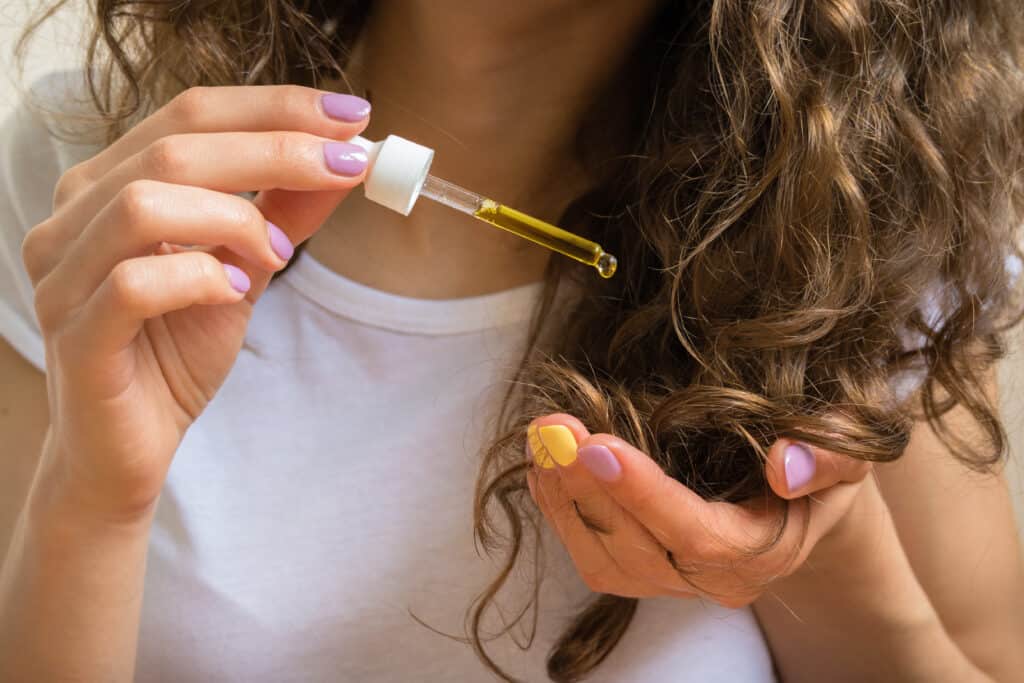
When To Use Your Sealing Oils
Sealing oils don’t sink into your hair strands, so try applying them on wash day when you’ve already treated your locks to plenty of moisture. That could be your usual rinse-out conditioner, a water-based leave-in conditioner, or a deep conditioning treatment. You can also apply a few drops of a sealant after a penetrating oil like coconut oil, sunflower oil, or babassu oil.
You can also use sealing oils as the final step of the LCO method after layering on a Liquid or Leave-in Conditioner and a Curl Cream. If you reverse the order of the oil and cream, that’s known as the LOC method.
People also use sealing oils when doing a twist-out or braided style, as a thick oil will help reduce friction between the strands and keep moisture locked in.
How Often Should You Oil Your Hair?
The answer to this question depends on several factors, like your hair type and how oily your scalp is. Although these oils are natural, applying too much oil could cause blocked hair follicles, which can lead to scalp issues like acne, dandruff, and hair loss.
You might wonder, ‘Can I oil my hair every day?’
However, it’s better to start by oiling your hair once or twice weekly and see what effect that has. Then, you can increase or decrease the frequency to suit your hair’s needs.
Who Should Not Use Sealing Oils?
If you already know your hair struggles with over conditioning and being too soft all the time (doesn’t hold style, gets fluffy, rarely feels dry), then using oils might not be a good fit for you.
If you start using a sealing oil, pay attention to how your hair behaves over the next few weeks. If you notice less definition, less shine, curls getting fluffy, or your hair just starts misbehaving, then clarify and take a break from the oils.

Tips for Using Sealing Oils in Hair
These are the three main ways to use sealing oils on hair:
Seal Hair
The first method is applying a sealing oil after you’ve washed and conditioned your hair to lock in moisture. Simply apply your chosen oil to your strands from root to tip by glazing it over your hair and scrunching your ends up.
This will also give your hair a gorgeous shine and help reduce friction between the strands, which can lead to split ends, tangling, and breakage.
Control Frizz
A sealing oil can also control frizz or flyaway hair by forming a coating over the hair shafts. Thicker oils with a high viscosity like black castor oil are best for this.
You can also use other oils like argan oil or grapeseed oil, which both penetrate and seal the strands, but they will create a thinner coating.
Scalp Massage
Scalp massage can reduce dandruff, increase blood flow, and stimulate your hair follicles to encourage healthy hair growth. Jojoba oil is a fabulous choice for this, as it is very similar to the scalp’s natural oil, sebum.
If you use black castor oil, jojoba or other oils regularly, washing your hair with a clarifying shampoo once or twice a month will help remove the product buildup different oils can cause.
FAQs
If you’re still wondering about how to use sealing oil, the answers to these frequently asked questions will help.
Is It OK To Mix Moisturizing and Sealing Oils?
This can be a great way to pamper coarse hair, which is more prone to drying out quickly. First, apply your preferred moisturizing oil to deliver moisture deep in the hair cortex, then follow up with a sealing oil to seal in all that juicy hydration.
Should You Cover Oiled Hair?
If you’re using a penetrating oil to moisturize your locks, you can cover your hair with a shower cap or t-shirt while it works its magic. This will stop the oil getting on your clothes, and the warmth will help your strands absorb the oil better.
Should I Oil Wet or Dry Hair?
That depends on what result you want to get from your oil. Applying a sealing oil to wet hair will give you less shine but is better for detangling and heat protection. On the other hand, applying your oil to dry hair will give better frizz control and shine.
Is It Good to Oil Hair Overnight?
You can leave a sealing oil like castor oil on your hair overnight, but leaving a moisturizing oil like coconut oil on for a longer period could cause conditions like blocked follicles and scalp acne.
The Bottom Line
In this guide, we’ve explained the difference between a penetrating oil like olive oil or coconut oil and sealing oils like castor oil and jojoba oil. You’ve also seen how to apply sealing oils to your locks to reduce frizz, protect your hair, and prevent hair breakage.
Hair oils are a fantastic, low-cost, and chemical-free way to pamper your hair, helping to make it softer, shinier, and less prone to hair breakage. Sealing oils are particularly great for thick, coarse, or high porosity hair that can struggle to retain hydration. They can also be used to massage your scalp, which can improve its health and encourage hair growth.
With all the information in this guide, now you’re ready to try out some sealing oils and see the benefits for your own hair!
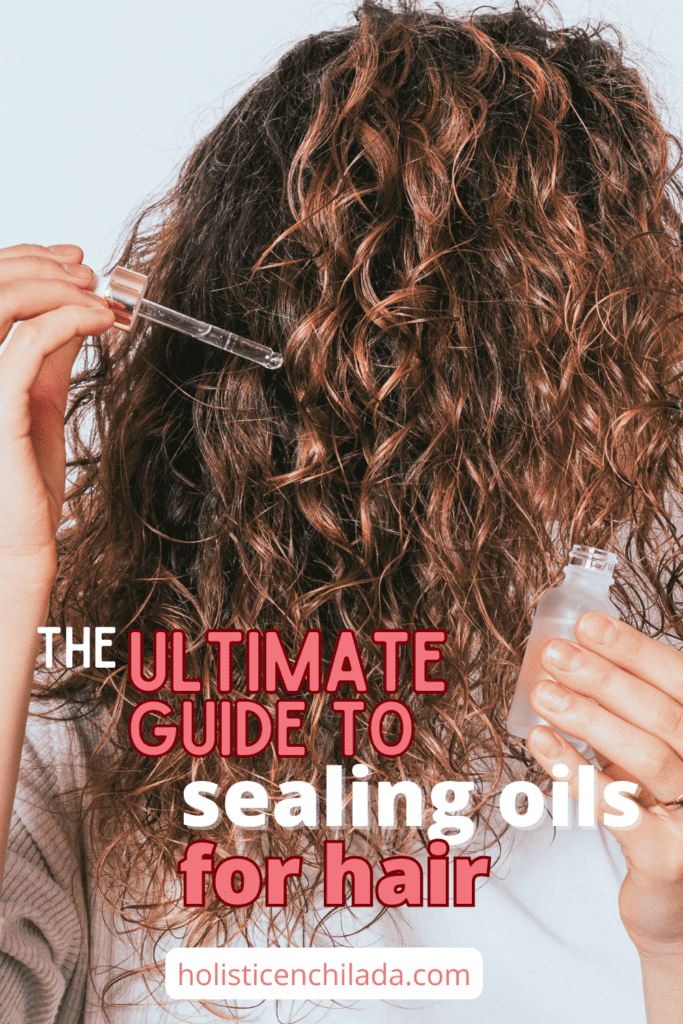

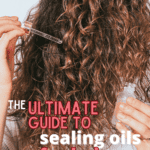
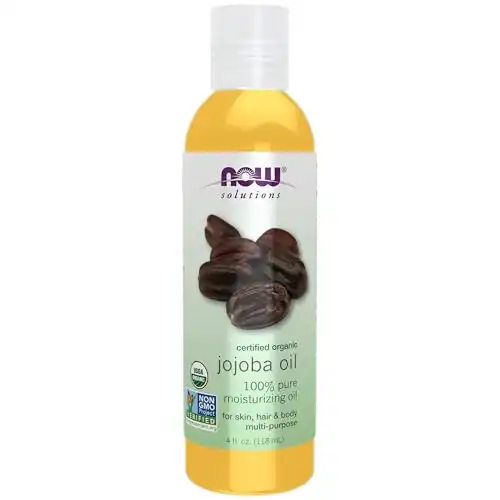
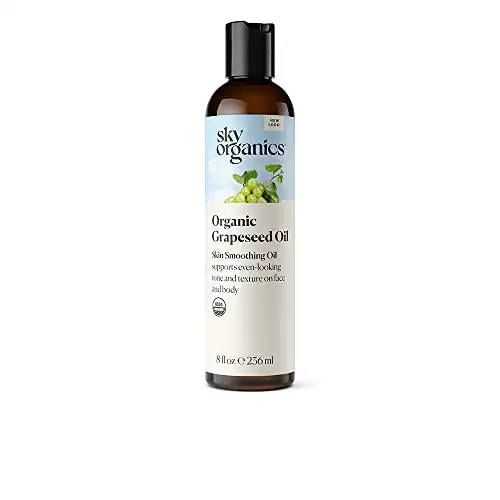


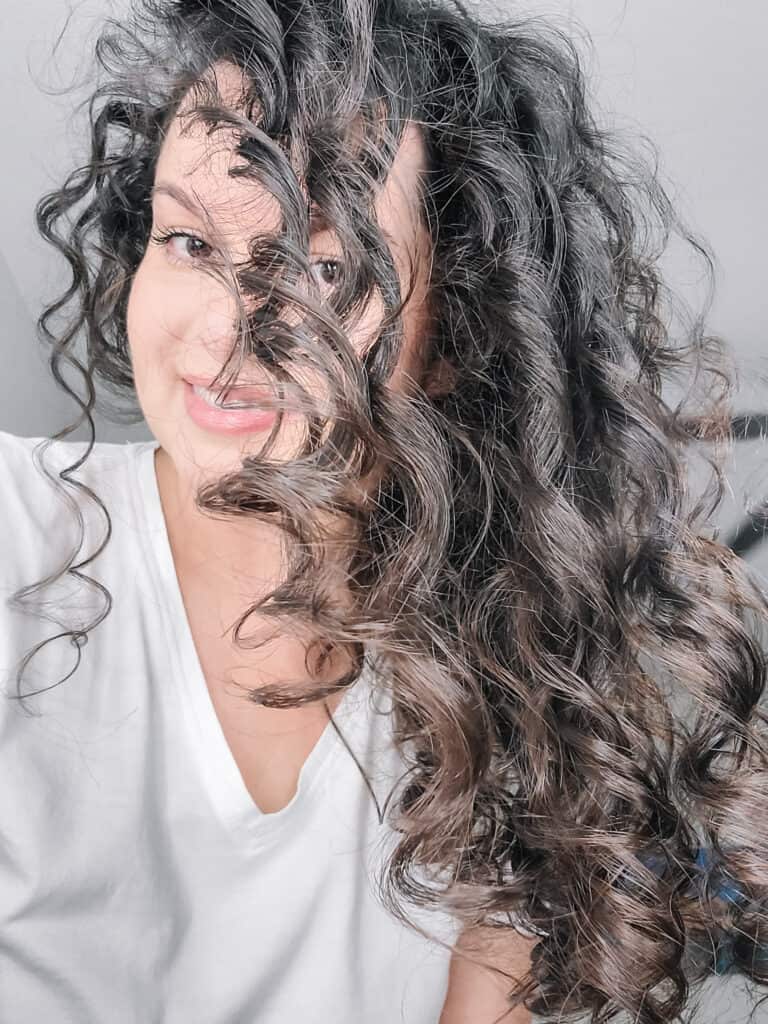
![How to Properly Care for Your 3A Hair [Quick & Easy!]](https://holisticenchilada.com/wp-content/uploads/2020/04/2020-09-14-093357587-768x1024.jpg)
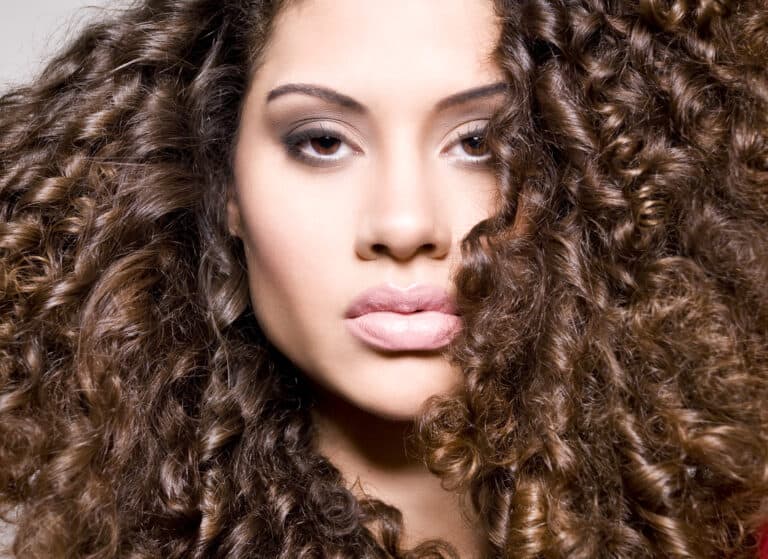


I’ve made my own blend with both types of oils, added aloe, vitamin E, and glycerin. I have low porosity, course and thick 3b type hair, and in the south with constant humidity. I use sunflower oil, hemp seed oil, avocado, jojoba, coconut, Shea, macadamia, carrot seed, argan and biotin. I use about an ounce of each. It usually last me a month. I use it every day after my leave in conditioner.
That sounds lovely! Glad it works for you.